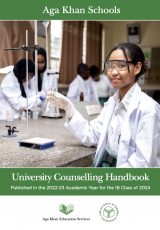Strengthening ties between Academies
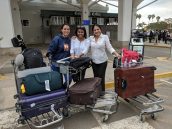
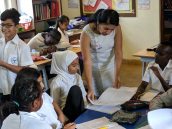
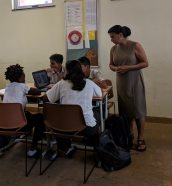
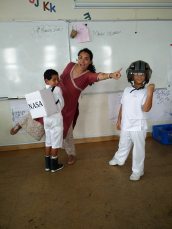
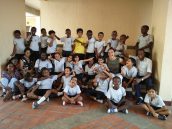
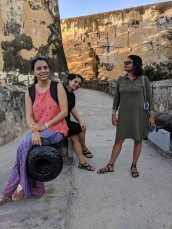
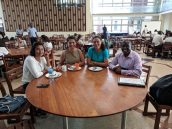
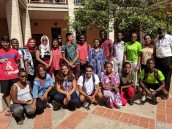
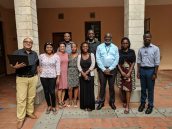
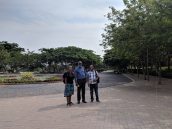



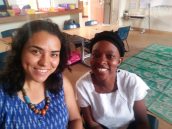

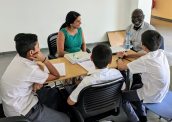
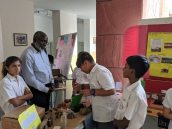
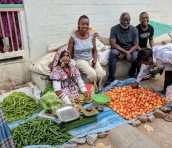
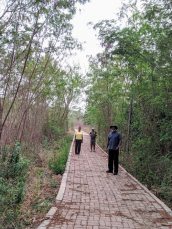 Three teachers from Hyderabad travelled to the Aga Khan Academy Mombasa in March 2018 as part of the Academies' teacher exchange programme. Their visit was followed by Aga Khan Academy Mombasa teachers travelling to the Hyderabad campus. Vasanthi Thandlam, Anandita Dutta and Ridhi Banerjee from Hyderabad stayed in the Kenyan city for two weeks, learning about their school culture and lifestyle, while Enitta Olang, Bernard Dudi and Kepha Obiri from Mombasa visited the Telangana capital to do the same.
Three teachers from Hyderabad travelled to the Aga Khan Academy Mombasa in March 2018 as part of the Academies' teacher exchange programme. Their visit was followed by Aga Khan Academy Mombasa teachers travelling to the Hyderabad campus. Vasanthi Thandlam, Anandita Dutta and Ridhi Banerjee from Hyderabad stayed in the Kenyan city for two weeks, learning about their school culture and lifestyle, while Enitta Olang, Bernard Dudi and Kepha Obiri from Mombasa visited the Telangana capital to do the same.
English as an Additional Language teacher Vasanthi was excited to be part of the exchange programme. “Beyond teaching basic learning curriculum, an exchange teacher has a unique ability to broaden students' world view by introducing new perspectives and teaching methodologies,” she said.
Vasanthi’s exchange partner was Kiswahili as an Additional Language teacher, Kepha Obiri. In her classes, Vasanthi learned about translanguaging (which allows bilingual students to use their entire repertoire in conversation), taught a class on media analysis for grade 9, and interacted with EAL students. The Aga Khan Academy Mombasa follows a dual-language programme where Kiswahili and English are integrated into one cohesive curriculum. This piqued her interest as a language teacher. Being a dorm parent at the Academy, Vasanthi was interested in learning about dorm life at Mombasa. She found that residential students eat a family meal with their dorm parent every Wednesday. “How true it is that food brings people together!” she said. “With it we make friends, build trust and count our blessings.”
Grade 3 form tutor Ridhi also has fond memories of the food she tried during her Mombasa sojourn. She recounts fantastic historic places, beaches and wildlife she saw in Kenya. But none of this, she says, compares to the love that her students in Mombasa showed her. She remembers being anxious at the beginning of the programme, before she had attended a class. “My first day of school was like leaving the familiar behind and plunging into the unknown,” she said.
Ridhi worked closely with grade 2 form tutor, Enitta Olang, and together they taught Junior School students poetry and stories, engaging them in difficult concepts through literature. During her time in Mombasa, Ridhi grew in strength as a teacher and found a great friend in Enitta. She also made great friends in her PYP students. “They tried really hard to teach me Kiswahili and I think they succeeded,” she said of the mutual learning experience. “I managed to learn a few words and sentences.” Kiswahili is the national language of Kenya and is widely spoken across East Africa.
AKA Hyderabad English teacher, Anandita holds the Academy in Mombasa in high regard. “The Aga Khan Academy Mombasa has always set standards across the network of Academies,” she said. Anandita was paired with Mombasa’s Head of Department of English, Bernard Dudi. Bernard has been teaching now for 27 years, and Anandita was eager to learn from the veteran. She observed grade 10, 11 and 12 English and Theory of Knowledge classes and debated pertinent issues with students. Anandita was impressed by how meticulously the sessions were planned. “Positive teacher–student relationships keep teachers and students motivated,” she said. Anandita came back from Mombasa wanting to foster such productive relations in her classrooms.
She also wants to keep in touch with the students she left behind in Mombasa. Anandita is planning to bridge the geographic divide with emails and Skype calls. Further, she wants to strengthen the relationship between the schools and their students.
During the two weeks that the AKA Hyderabad teachers spent in the coastal city of Mombasa, they experienced its culture, food, architecture and wildlife. But try as they might, they could not get their fill of Kenya. Despite the unforgettable sights, the memories they truly cherish are the memories they made with students and faculty at the Academy in Mombasa.
With the thought of coming back also came the thought of staying in touch. AKA Hyderabad visiting faculty all made plans to maintain the relationships they had made there. They created methods to share unit plans, planned Skype sessions and exchanged email addresses and phone numbers. However, these plans were made with great reluctance because it meant saying farewell to the people they had met and connected with. A little nostalgic and entirely rejuvenated, the three teachers boarded a plane back to Hyderabad.
Hot on the trail of the recently returned educators, a delegation of three teachers from Mombasa left for the Aga Khan Academy Hyderabad. Bernard, Enitta and Kepha arrived at the Academy just as students returned from spring break, for the second leg of the teacher exchange programme.
Visiting faculty loved the picturesque landscape of the Academy. “It is huge and looks very natural,” said Kepha Obiri. “It is an ideal learning environment away from the hustle and bustle of city life.” Kepha is a language teacher specialising in Kiswahili and an advocate of translanguaging. To him, languages play a foundational role in His Highness the Aga Khan's vision for home-grown leaders. Part of the reason he chose to go on the exchange programme was to see how languages are accommodated and used in Hyderabad.
Kepha’s time was shared between the Senior and Junior Schools. At the Senior School, he shadowed Vasanthi in her classes, and at the Junior School, where he admittedly spent more time, he taught and observed classes, sat in on staff meetings and met with specialised teachers. “I have not seen such willingness to help and politeness as I have seen from teachers here,” he said of the faculty. Kepha built great relationships with PYP teachers of grades 3, 4 and 5 and looks forward to collaborating with them on future teaching plans and seeking their guidance in his own classroom. Kepha is a proud graduate of the Academies' Teacher Preparation Programme, and sat for a meeting of the same while in Hyderabad.
Enitta spent a major chunk of her time at the Junior School, too. She taught classes by herself and also taught in a team. Students learnt the song ‘Sikiliza Mama We’, a Kiswahili children’s song meaning “Listen Mama” from her. Coming from the dual language programme in Mombasa, one of her reasons for volunteering for the teacher exchange was her interest in the facilitation of languages in Hyderabad. Enitta and Ridhi became famous friends in Mombasa and got to continue collaborating once she arrived in Hyderabad. She was interested in knowing the cultural heritage of Hyderabad and trying the famous food. With grade 4 students, Enitta visited the Chowmahalla Palace and went with grade 1 to the Birla Planetarium.
“The students are wonderful and respectful,” she said. “I have met very caring students, teachers and support staff who are always willing and inviting.” Enitta enjoyed talking about pedagogy with teachers and looks forward to maintaining that relationship over email. In fact, some of her students in Mombasa are now pen pals with students in Hyderabad whom they call ‘Hyderabuddies.’
For visiting teachers, local experiences were full of unexpected surprises. “My height was the focus as opposed to my race,” said Bernard after visiting a local market. “I found that refreshing!” Bernard taught English and Theory of Knowledge classes while he was in Hyderabad, but the main purpose of his joining the exchange programme was to observe His Highness’ vision in a new context. “As a teacher, I wanted to explore best practices in Hyderabad to inform my critical reflections on my own practice in the Mombasa context,” he said. Bernard’s counterpart was Anandita, with whom he taught classes and co-wrote lesson plans at the Senior School.
“This has been a real opportunity for us to establish potential areas of collaboration,” said Bernard. “We are already sharing resources and we hope to continue doing this electronically.” He wants to create a dialogue between the heads of department of the schools to identify the units, teaching strategies, Aga Khan Strands and assessment practices that Academy teachers can explore together.
Visiting faculty tried to make the best of the cultural experience on offer at the Academy and around Hyderabad. They loved the vast, serene expanse of the campus and the animals that live there.
After nearly a month of travelling, hosting and more months of planning, the second Academy teacher exchange programme came to a close. The six participating teachers are all back in their schools and their routines in Hyderabad and Mombasa, but they still feel the impact that the exchange has had on their teaching and their lives. “[The exchange programme will remain one of the highlights of my career and perhaps the most valuable professional development opportunity in my three decades of experience,” said Vasanthi. The route from India to Mombasa was a busy trade route in the 15th century. It gives the Academy great pride to be part of this centuries old heritage.
Written by Ajay Sundaram



